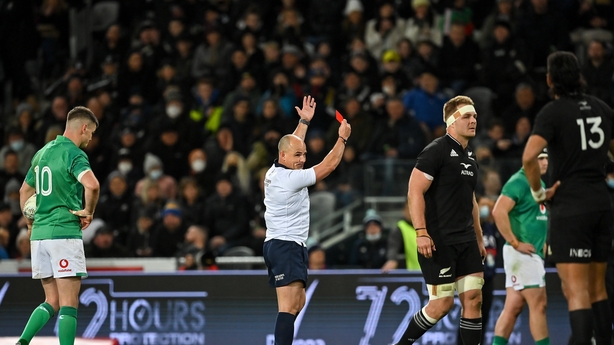World Rugby has confirmed three new law changes which will be effective from 1 July, with the controversial so-called 'Dupont Law' among those to be changed.
The sport's governing body has rewritten Law 10.7, which refers to being onside and offside from kicks in play, tightening the wording to ensure all attacking players must retreat until they are back onside off a kick.
The loophole in the previous wording had become known as the 'Dupont Law' after the France captain Antoine Dupont exposed the loophole in the previous wording, which allowed players in an offside position advance forward once an opposition player did similar.
That interpretation of the law led to farcical scenes during this year's Guinness Six Nations tie between France and Scotland, where both sets of teams kicked the ball back and forth to each other, as the majority of players stood still in the middle of the pitch, waiting to be played onside.
Under the new wording of the law, players ahead of the kicker must now make an active attempt to retreat until they are put onside.
A World Rugby statement reads: " In a rewrite of Law 10.7 relating to players being put onside from kicks in open play, it will no longer be possible for a player to be put onside when an opposition player catches the ball and runs five metres, or passes the ball.
"Laws 10.1 and 10.4 will make clear that offside players must make an attempt to retreat, creating space for the opposition team to play. This should reduce the amount of kick tennis in the game."
'It was smart by Dupont and everyone is copying it now, but it is an area that they (authorities) will have to change' - @bernardjackman explains the ‘Dupont law’ and its impact on the game #AgainstTheHead pic.twitter.com/pG4OYkCZOM
— RTÉ Sport (@RTEsport) February 5, 2024
World Rugby has also confirmed that the option of a scrum has been removed for a free-kick, with teams having to either tap-and-go or kick the ball, which World Rugby say will "encourage more ball flow".
The governing body have not clarified whether or not this applies to free-kicks that have been given at a scrum, with critics of the change believing it gives teams losing the scrum battle an easy out.
The other law change will see the controversial 'Crocodile roll' outlawed at rucks, with the action of rolling, twisting or pulling of a player on their feet in the tackle area to be sanctioned by a penalty.
Additionally, WR has announced a series of law trials, which will be rolled out across the World Rugby U20 Championship, U20 Trophy and Pacific Nations Cup this summer.
Among the trials will be the controversial 20-minute red card, which allows teams to replace a red-carded player with a substitute after 20 minutes.
The trials will also see a 30-second shot clock introduced for scrum and lineout setting, while the conversion shot clock will be reduced from 90 seconds to 60.
In a bid to reduce the number of scrums in a game, crooked lineouts will also be permitted if the opposition don't contest the ball.
World Rugby are also set to streamline their disciplinary process, with a closed trial for automatic sanctions to be issued for red cards in situations where a player has attempted to make a legal tackle or not attempted to make a legal tackle.

The trial, which will be in use for the WXV and World Rugby U20 Championship this summer, will see automatic bans be applied to red cards involving foul play, promoting consistency of outcomes.
According to World Rugby, the new sanctions will be:
Foul play – Automatic two weeks: where a player has attempted to affect a legal rugby action and/or has committed a reckless action but has made minor errors such as in technique or timing
Aggravated foul play – Automatic four weeks: where a player has affected a highly reckless action and/or a non-legal rugby action (tucked arm, no attempt to wrap, driving tackle)
A Sanction Committee comprising members with rugby experience will calibrate all red card sanctions from a round/weekend of matches. No mitigation will be applied in the automatic sanction scenarios, creating an environment of consistency, while making the process easier for players and fans to understand.
Listen to the RTÉ Rugby podcast on Apple Podcasts, Spotify or wherever you get your podcasts.
Watch Munster v Connacht in the URC on Saturday from 4.45pm on RTÉ2 and RTÉ Player, follow a live blog on rte.ie/sport and the RTÉ News app and listen to updates on Saturday Sport on RTÉ Radio 1


